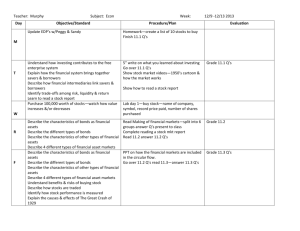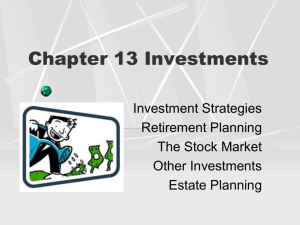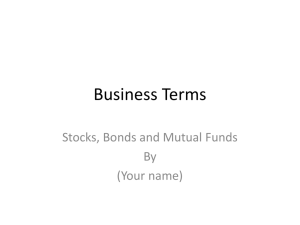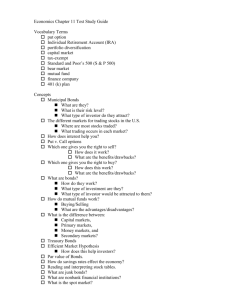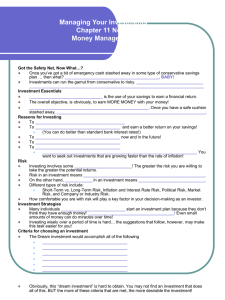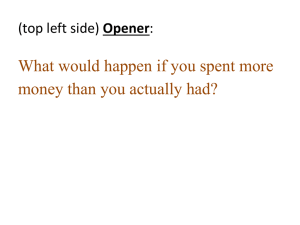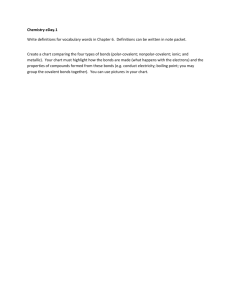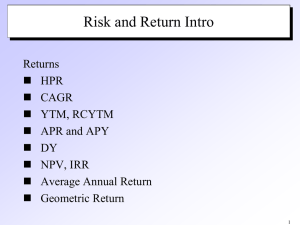Chapter 11 * Financial Markets
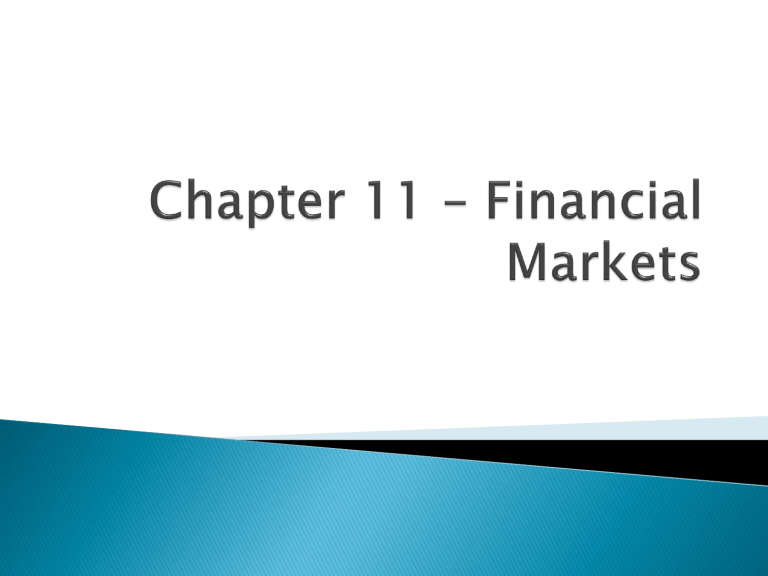
Savings – income not used for consumption
Investment – the use of income today that allows for a future benefit
Financial System – all the institutions that help transfer funds between savers and investors
Individuals and business can save surplus funds in many ways – becomes a financial surplus
◦ Savings accounts at commercial banks
◦ Savings accounts at Savings and Loans
◦ Certificates of Deposit (CDs)
◦ Corporate Bonds
◦ Government Bonds
◦ Stocks
Financial intermediary – institution that collects funds from savers and invests the funds in financial assets
◦ Banking Financial Intermediaries Examples:
Commercial and Savings and Loans Savings Accounts
◦ Nonbank Financial Intermediaries Examples:
Finance companies
Mutual funds
Pension funds
Life insurance companies
Capital Market – where long-term financial assets are bought and sold
Money Market – where short-term financial assets are bought and sold
Primary market – buying financial assets directly from the issuer
Secondary market – where financial assets are resold
Why are you investing?
◦ You need to develop a reason as to why you are investing = investment objective
Saving money for retirement
Down payment on a house or an automobile
For college tuition
For a vacation
◦ 2 issues play a major role in determining which investments work best to achieve different investment objectives
Time – how long of a time do you need to reach your income goal
Income – how much money do you have available to save after meeting current expenses
What kind of risk are you willing to take?
◦ Think about the possibility of losing some of their initial investment – most people want to get back at least what they put in
◦ Investments that guarantee no loss of principal
Insured savings deposits
CDs
Bonds backed by the US government
◦ Biggest risks investors face is loss of the purchasing power of the money invested due to inflation
◦ Stocks and corporate bonds carry a higher degree of risk because the return depends on how profitable the company is
◦ The greater the risk, the greater the return
What kind of return do you want?
◦ Safest investments generally offer the lowest return in the form of fixed rates of interest
◦ Returns on stocks and bonds are not guaranteed and may vary considerably at different times
◦ People who are investing for retirement over a period of 20-30 years may be willing to take more risk by investing in stocks because their investments are likely to increase over that period, even though they might have losses in some years
◦ People with less time and less income to invest might not be willing to risk possible losses
◦ Diversification is the most common way for investors to maximize their returns and limit their risks
Why buy stock?
◦ Earn dividend payments – a share of the corporation’s profits that are paid back to the corporation’s stockholders
◦ Earn capital gains by selling the stock at a price greater than the purchase price
Stock Exchange – a market where securities are bought and sold
Capital Gain – profit made from the sale of securities
Types of Stocks
◦ Common stock – gives shareholders voting rights and a share of profits
◦ Preferred Stock – gives shareholders a share of profits but, in general, no voting rights
Stockbroker – buys and sells securities for customers
Organized Stock Exchanges
◦ New York Stock Exchange (NYSE) – located in NYC, also known as the US stock market
Traditional, organized auction format
Specialist representing that stock runs the auction that matches buys and sellers through open bidding to determine the price of shares
Prices for a stock often vary from minute to minute as the auction process continues throughout the day
Merged with Archipelago Exchange (electronic exchange) and Euronext (European Stock)
◦ Over-the-Counter Stock Exchanges
Used to describe the market for stocks that are not traded on a formal stock exchange
National Association of Securities Dealers (NASDAQ) – a centralized computer system that allows OTC traders around the country to make trades at the best prices possible
◦ Futures and Options Markets
Future – contract to buy or sell a commodity at a specified future date and price
Option – gives an investor the right to buy or sell stock at a future date at a preset price
◦ Recent Developments
Revised regulations and advances in computer technology have changed the way stocks are traded
Stocks listed on any exchange are now available to any trading firm
Trading takes place 24 hours a day
Growth in online brokerage companies
Stock Indexes
Bull Market – occurs when stock market prices rise steadily over time
Bear Market – occurs when stock market prices decline steadily over time
Maturity – the date when a bond is due to be repaid
Coupon Rate – the interest rate a bondholder receives every year until maturity
Yield – annual rate of return on a bond
Junk bonds – high risk, high yield corporate bonds
Corporate bonds – help businesses expand
Treasury bonds – help keep the federal government operating
Municipal bonds – make state and local projects possible
Determine reason for buying bonds in order to purchase the right type of bond
Market interest rates
Main risk that bond buyers face is that the issuer will default, or be unable to repay the borrowed money at maturity
Certificates of Deposit
Money Market Mutual Funds
